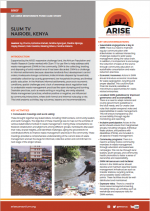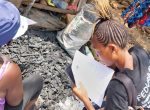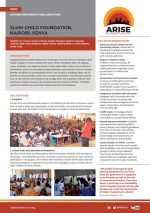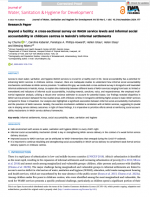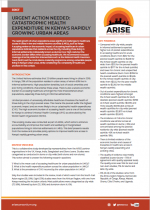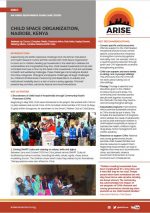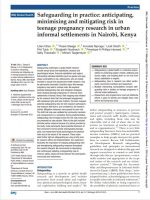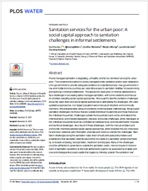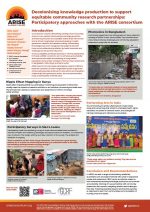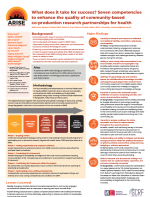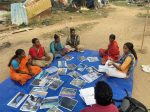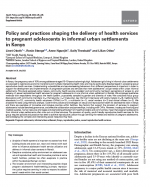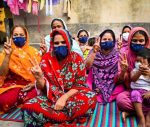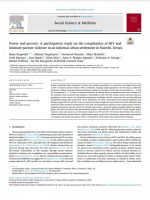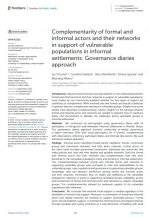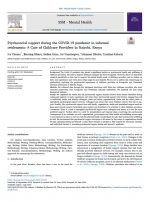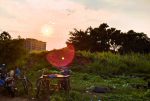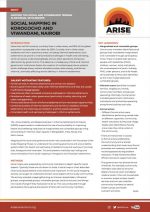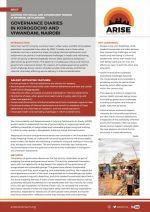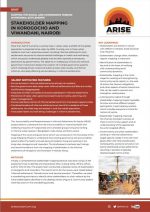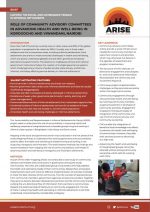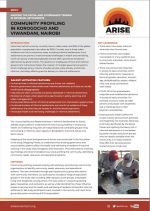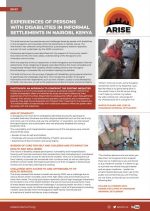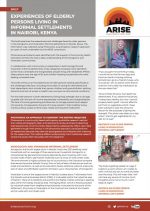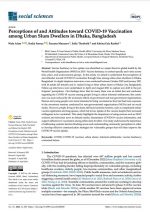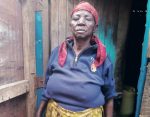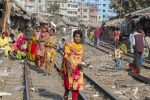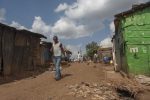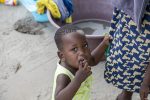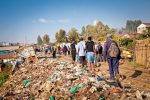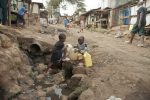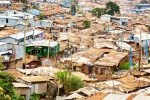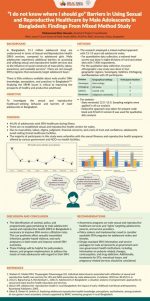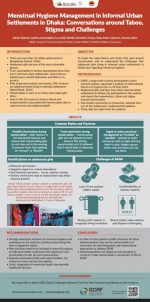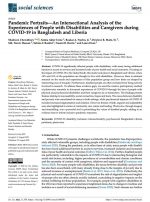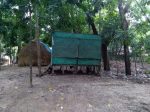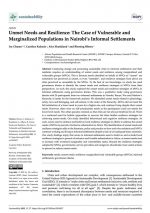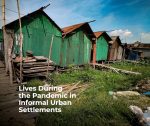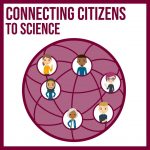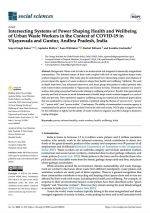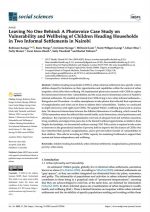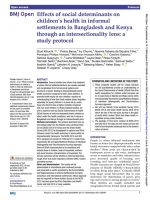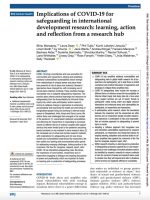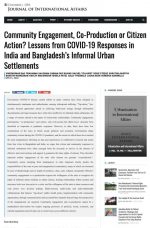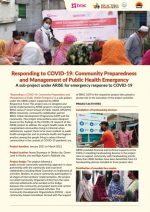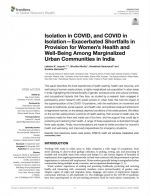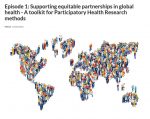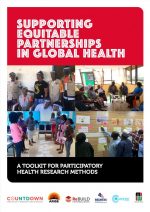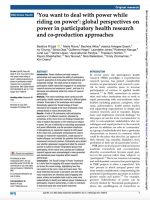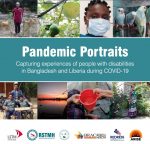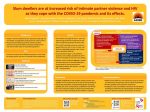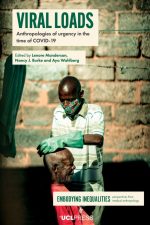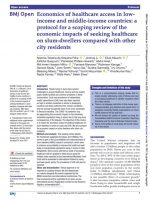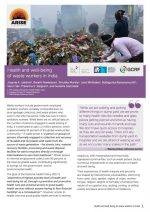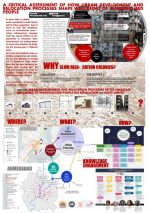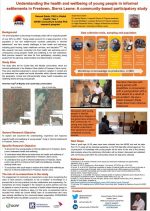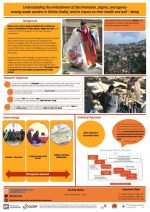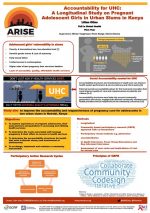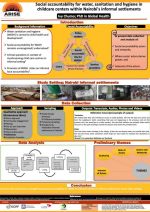Learn more
Supported by the ARISE responsive challenge fund, the African Population and Health Research Center worked with Slum TV to use film to help address solid waste management (SWM) in the community. SWM is the collecting, treating and disposing of solid material once it has been discarded. SWM is a challenge in informal settlements because: absentee […]
In May 2023 a health and wellbeing survey of informal settlement residents in Cockle Bay, Moyiba and Dwazark, in Freetown, Sierra Leone was undertaken by ARISE partners. This blog acts as a summary, highlighting some of the main findings. We also have the full survey report available for download. Background This survey builds on the […]
Through the Responsive Challenge Fund, ARISE partnered with local NGO PHASE Nepal to carry out implementation research to assess the status of living conditions and accountability in informal settlements through a mixed method study. This book was produced with the support of community members from the Manohara and Namuna Basti informal settlements of the Kathmandu […]
We’re thrilled to announce the publication of our colleague Professor Sabina Faiz Rashid’s book Poverty, Gender and Health in the Slums of Bangladesh: Children of Crows. Sabina is the Mushtaque Chowdhury Chair in Health and Poverty at BRAC’s James P Grant School of Public Health and ARISE PI in Bangladesh, and has written about the […]
Supported by the ARISE Responsive Challenge Fund, the African Population and Health Research Centre worked with Slum-Child Foundation (SCF) to address water, sanitation and hygiene (WASH). Clean water often costs more in informal settlements when it is provided by intermediaries, reducing the amount of water people can afford for handwashing. With a lack of space, […]
Abstract Access to clean water, sanitation, and hygiene (WASH) services is crucial for a healthy start in life. Social accountability has a potential for enhancing WASH services in childcare centres. However, there are inadequate studies to understand how informal social accountability mechanisms contributes to WASH service provision. To address this gap, we conducted a cross-sectional […]
Supported by the ARISE responsive challenge fund, the African Population and Health Research Centre (APHRC) worked with the U-Tena youth organization to address solid waste management (SWM). SWM entails collecting, treating, and disposing of solid material that is discarded because it has served its purpose or is no longer useful. SWM is a challenge in […]
In this interesting, new video learn about the program run by an alliance of SPARC, National Slum Dwellers Federation and Mahila Milan (a women’s savings collective) to support program those with TB and their families. This work was undertaken as part of the ARISE consortium’s work in India. [embedyt] https://www.youtube.com/watch?v=BXSIz2oXLAk[/embedyt]
This brief on catastrophic health expenditure in Kenya’s rapidly growing urban areas look at how the rapid growth of urban populations poses significant challenges to healthcare access in cities in low and middle-income countries (LMICs), such as Kenya. A scoping review on the economic impact of accessing healthcare in urban populations indicates that residents across […]
Supported by the ARISE Responsive Challenge Fund, the African Population and Health Research Centre (APHRC) worked with Child Space Organization to reach out to children heading up households in the attempt to address the vulnerabilities and marginalities they face. Child headed households (CHHs) refer to families that have a minor as the head of the […]
Abstract This article critically reviews the literature on urban informality, inequity, health, well-being and accountability to identify key conceptual, methodological and empirical gaps in academic and policy discourses. We argue that critical attention to power dynamics is often a key missing element in these discourses and make the case for explicit attention to the operation […]
Abstract Safeguarding challenges in global health research include sexual abuse and exploitation, physical and psychological abuse, financial exploitation and neglect. Intersecting individual identities (such as gender and age) shape vulnerability to risk. Adolescents, who are widely included in sexual and reproductive health research, may be particularly vulnerable. Sensitive topics like teenage pregnancy may lead to […]
Abstract Poorly managed sanitation is degrading, unhealthy and far too dominant among the urban poor. The conventional solution to poorly managed onsite sanitation and/or open defecation is for governments to provide adequate sanitation at subsidised prices. Few governments in low and middle income countries can subsidise access to sanitation facilities for people living and working […]
Waste workers-otherwise known as sanitation workers-are often made invisible due to informal work arrangements. In India, as in other parts of the world, sanitation workers tend to be from the oppressed and marginalized communities with little access to healthcare and quality health services. This despite, their work being highly important to society and exposing them […]
Co-production requires dismantling existing power hierarchies. As such, it can support decolonising knowledge generation and fostering inclusive and equitable relationships with diverse (and at times) marginalised actors participating in health governance, research and decision-making. Decolonising knowledge production recognises that expertise lies with those communities directly affected by health inequities and challenges as well as other […]
Decolonising health research requires a shift to inclusive processes, and actively engaging with communities. Community-based participatory research (CBPR) fosters collaboration among communities, researchers, and implementers to produce contextual knowledge for action. Enhancing co-production skills and competencies has been shown to improve research quality and validity, while CBPR principles have been developed, limited guidance exists on […]
Waste pickers in India are extremely vulnerable to a range of health problems due to their poor living and unsafe working conditions, and struggle to access the health services they are entitled to. This research uses a community-based participatory research and focuses specifically on vector-borne diseases in two districts of Andhra Pradesh, exploring how they […]
In Kenya, the pregnancy rate of 15% among adolescents aged 15–19 years is alarmingly high. Adolescent girls living in informal urban settlements are exposed to rapid socio-economic transitions and multiple intersecting health risks and may be particularly disadvantaged in accessing sexual reproductive health services. Understanding vulnerabilities and service-seeking behaviours from different perspectives is important in order […]
In this episode of the Health Policy and Planning Podcast, LSHTM’s Public Engagement Manager, Karl Byrne is joined by our colleague Linet Okoth from LVCT Health. They talk about her paper “Policy and practices shaping the delivery of health services to pregnant adolescents in informal urban settlements in Kenya.” It’s a fascinating conversation that covers […]
This photo-narrative book was developed with community members from Green Land (Khulna), Bajekazla (Rajshahi) and Shyampur (Dhaka) communities, as part of the ARISE Responsive Fund in Bangladesh. It tells the stories of how many marginalised people in urban informal settlements of Bangladesh were affected by the COVID-19 pandemic, and how they came together to respond […]
Abstract People in informal urban settlements in Kenya face multiple inequalities, yet researchers investigate issues such as HIV or intimate partner violence (IPV) in isolation, targeting single populations and focusing on individual behaviour, without involving informal settlement dwellers. We formed a study team of researchers (n = 4) and lay investigators (n = 11) from an informal settlement in Nairobi, Kenya to […]
Beyond several interests and speculations on the relationship between formal and informal actors and their networks in support of vulnerable populations, most studies do not conclusively establish whether the two types of support are substitutes or complements. While informal care and formal care may be substitutes in general, they are complements among the vulnerable groups. […]
The COVID-19 pandemic has placed a significant burden on psychosocial health and wellbeing of childcare providers. The need to support childcare managers has been recognized. However, there is to date little research specifically on how best to support the mental health needs of childcare providers, and no studies on their own experiences and views about what might be […]
Worldwide, infrastructure expansion and visions of ‘slum-free cities’ displace people living in informal settlements. Without community participation in these processes and accountability mechanisms in place’ such displacement can adversely impact people’s health and well-being. This piece outlines SPARC’s (Society For Promotion of Area Resource Centres, SPARC is an NGO based in India promoting action of […]
Waste pickers in India are extremely vulnerable to a range of health problems due to their poor living and unsafe working conditions, and struggle to access the health services they are entitled to. This research uses a community-based participatory research and focuses specifically on mosquito-borne diseases in two districts of Andhra Pradesh, exploring how they […]
Filmed in Freetown, Sierra Leone, the documentary looks at the realities of life for people living in informal settlements. It also explores ARISE’s community based participatory research approach, undertaken in partnership with communities to claim their rights to health, and address issues of health and political accountability to put people at the heart of decision […]
Introduction One of the major challenges that persons with disabilities (PWDs) are facing globally is unemployment. The challenge is attributed to systems that are not built with inclusivity in mind by employers. As such, the work of inclusion is not inviting PWDs to do more but to make a difference through social support. Most research […]
To celebrate the 125th anniversary of Liverpool School of Tropical Medicine, artist Luke Jerram is working in Freetown, Sierra Leone in collaboration with ARISE. Helping to empower local communities, we worked with local teams to install 21 solar powered LED streetlights within the informal settlements of Freetown. We installed the permanent lighting in public areas including water collection areas, […]
The Accountability and Responsiveness in Informal Settlements for Equity (ARISE) project seeks to understand the role of accountability in improving health and wellbeing inequities of marginalised and vulnerable groups living and working in informal urban spaces in Bangladesh, India, Kenya and Sierra Leone. Mapping of the social and governance terrain was conducted in the first […]
The Accountability and Responsiveness in Informal Settlements for Equity (ARISE) project seeks to understand the role of accountability in improving health and wellbeing inequities of marginalised and vulnerable groups living and working in informal urban spaces in Bangladesh, India and, Kenya and Sierra Leone. Mapping of the social and governance terrain was conducted in the […]
The Accountability and Responsiveness in Informal Settlements for Equity (ARISE) project seeks to understand the role of accountability in improving health and wellbeing inequities of marginalised and vulnerable groups living and working in informal urban spaces in Bangladesh, India, Kenya and Sierra Leone. Mapping of the social and governance terrain was conducted in the first […]
The Accountability and Responsiveness in Informal Settlements for Equity (ARISE) project seeks to understand the role of accountability in improving health and wellbeing inequities of marginalised and vulnerable groups living and working in informal urban spaces in Bangladesh, India, Kenya and Sierra Leone. Mapping of the social and governance terrain was conducted in the first […]
The Accountability and Responsiveness in Informal Settlements for Equity (ARISE) project seeks to understand the role of accountability in improving health and wellbeing inequities of marginalised and vulnerable groups living and working in informal urban spaces in Bangladesh, India and, Kenya and Sierra Leone. Mapping of the social and governance terrain was conducted in the […]
This brief examines the experiences and challenges faced by people with disabilities in the Korogocho and Viwandani informal settlements in Nairobi, Kenya. The information was collected using Photovoice, a participatory research approach, as a part of work undertaken by the ARISE consortium. Photovoice participants were identified with the support of Community Health Volunteers (CHVs) who […]
This brief examines the experiences and challenges faced by older persons in the Korogocho and Viwandani informal settlements in Nairobi, Kenya. The information was collected using Photovoice, a participatory research approach, as a part of work undertaken by the ARISE consortium. Photovoice participants were identified with the support of Community Health Volunteers (CHVs) who had […]
Abstract Vaccine hesitancy or low uptake was identified as a major threat to global health by the World Health Organization (WHO) in 2019. Vaccine hesitancy is context-specific and varies across time, place, and socioeconomic groups. In this study, we aimed to understand the perceptions of and attitudes toward COVID-19 vaccination through time among urban slum […]
Abstract Slums and informal settlements have long been a policy concern, particularly in post-independence cities of the global South. Although national and local governments devise public policy seeking to address these habitations, these policy initiatives occur in conversation with the often far less visible global policy discourses of international urban development actors. Positing their ideational […]
“…I sometimes ask myself whether we shall be able to overcome and make it through to take care of the children” – Lenar is an older person living in Viwandani Informal Settlement View the photobook here This gallery has been created using a selection of images included in a recent Photovoice project. The project is […]
Abstract Empirical evidence suggests that the health outcomes of children living in slums are poorer than those living in non-slums and other urban areas. Improving health especially among children under five years old (U5y) living in slums, requires a better understanding of the social determinants of health (SDoH) that drive their health outcomes. Therefore, we […]
Abstract The complexity of issues addressed by research for development (R4D) requires collaborations between partners from a range of disciplines and cultural contexts. Power asymmetries within such partnerships may obstruct the fair distribution of resources, responsibilities and benefits across all partners. This paper presents a cross-case analysis of five R4D partnership evaluations, their methods and […]
Abstract Catalyzing change and promoting sustainable cities in informal settlements and their residents requires an understanding of unmet needs and resilience among marginalized and vulnerable groups (MVGs). This is because needs identified on behalf of MVGs as “unmet” are sometimes not perceived as unmet, or even “meetable”, and resilience strategies from above are often perceived […]
Background Accountability strategies are expected to enhance access to water, sanitation and hygiene (WASH) service delivery in low-and middle-income countries (LMIC). Conventional formal social accountability mechanisms (SAMs) for WASH service delivery have been inadequate to meet the needs of residents in informal settlements in LMICs. This has prompted growing interest in alternative informal SAMs (iSAMs) […]
Introduction A range of community engagement initiatives to advance health and wellbeing are currently taking place in informal settlements in low and middle income countries (LMICs), including community and stakeholder meetings, use of radio, film, TV programs and other information, education and communication materials (IECs) organized by different stakeholders. While these initiatives tend to focus […]
Abstract Social accountability for water, sanitation and hygiene (WASH) services is a critical component to realising child rights to WASH services by the urban poor, more so in childcare centres. Despite the existence of discrete social accountability mechanisms (SAMs) in informal settlements, informal SAMs rarely form part of strategic approaches to addressing social accountability challenges […]
Abstract Introduction Despite many institutions gaining access to improved water sanitation and hygiene (WASH) services, childcare centres in informal settlements have low access and poor condition of WASH services. It is imperative to understand how existing actors and social networks operate in the WASH sector in childcare centres in Nairobi’s informal settlements. Objective To empirically […]
Please turn on closed captions for subtitles on this video! The ARISE team in India organised an exchange between the waste workers in Shimla and Vijaywada and the alliance of SPARC, NSDF and Mahila Milan. Supported by ARISE and funded by GCRF, a group of waste workers, both men and women, from Shimla and Vijaywada […]
“I do not know where I should go” Barriers in Using Sexual and Reproductive Healthcare by Male Adolescents in Bangladesh: Findings From Mixed Method Study This poster by Muhammad Riaz Hossain was presented at the National Adolescent Health Conference in Bangladesh. It was funded by the Embassy of the Kingdom of the Netherlands project titled ‘Understanding Sexual […]
Menstrual Hygiene Management in Informal Urban Settlements in Dhaka: Conversations around taboo, stigma and challenges This poster by Adrita Rahman was presented at the National Adolescent Health Conference in Bangladesh. The poster won first prize at this national event.
Abstract COVID-19 significantly affected people with disabilities, with many facing additional barriers in access to services and increased risks of poor health and social outcomes. Focusing on the impact of COVID-19 in the Global South, this study took place in Bangladesh and Liberia, where 14% and 16% of the population are thought to live with […]
Shahreen Chowdhury, Liverpool School of Tropical Medicine COVID-19 changed the world as we know it. However, the pandemic significantly affected people with disabilities with many facing additional barriers in access to services, increased isolation and increased risks of poor health and social outcomes. This study took place in Bangladesh and Liberia, where there is minimal […]
Abstract Catalyzing change and promoting sustainable cities in informal settlements and their residents requires an understanding of unmet needs and resilience among marginalized and vulnerable groups (MVGs). This is because needs identified on behalf of MVGs as “unmet” are sometimes not perceived as unmet, or even “meetable”, and resilience strategies from above are often perceived […]
Rani has had debilitatingly painful periods ever since she started relying on injectable contraceptives. When she reached out to her doctor for help, she was told to be patient and that “this happens, it is quite normal.” But it does make it very difficult for her to manage her periods. Not only does she have to […]
This photo-narrative book was developed with community members from Green Land (Khulna), Bajekazla (Rajshahi) and Shyampur (Dhaka) communities. It tells the stories of how most marginalised people in urban informal settlements of Bangladesh were affected by the COVID-19 pandemic, and how they came together to respond to the challenges. This action was stimulated and facilitated […]
Earlier this month at the Seventh Global Symposium on Health Systems Research in Bogota, Colombia the ARISE consortium hosted a session on power, “You want to deal with power while riding on power”: Visualising the social ecology of power in politics and policy in health systems. In the session participants were asked to engage in […]
As part of the Seventh Global Symposium on Health Systems Research the ARISE consortium hosted an online session, ‘Accountability from below? Learning from participatory research processes on water and sanitation in informal settlements’. Hosted by Vinodkumar Rao, the session included the voices of our co-researchers and partners in our focus countries Bangladesh, Kenya and Sierra […]
Recent calls to decolonise global health have resulted in an overdue but critical reflection of power sharing in partnerships. Many partners have adopted their own agendas to support this goal, yet cross learning and sharing between partners has been limited owing to a lack of knowing ‘what works’ to support equitable partnerships in practice. While […]
In this episode, we hear from two PhD students from the ARISE Consortium. ARISE stands for accountability and responsiveness in informal settlements for equity, and is about promoting social change for improved health and wellbeing with communities and people living and working within urban informal spaces. This episodes guests: Bachera Aktar Assistant Director, The Centre […]
The Seventh Global Symposium on Health Systems Research is ongoing in Bogota Colombia. The theme of this year’s Conference is Health Systems Performance in the Political Agenda: Sharing lessons for current and future global challenges which directs attention at the significant strife the world has faced during the COVID-19 pandemic. On the first day of […]
The Ripple Effect Mapping Tool provides a space for research partners to reflect on their achievements and refocus on their aims while also supporting reflexivity processes on positionality, inclusion and equity. As such, grounds the research within the lived realities of communities. The tool also supports communities and researchers to engage in critical learning. It […]
Despite gender equality policies at the national level in many African countries, there are persistent gender-based disparities, inequalities and exclusions faced by many women, particularly among low-income urban residents. And while urbanisation may offer greater opportunities for women – for example, in employment, access to services and changes in social and household dynamics – this […]
Abstract Waste work in India is an undervalued role relegated to historically marginalised communities. The informal nature of their work coupled with lack of state regulation keeps waste workers trapped in poverty. This study aims to understand how intersecting systems and relations of power impact the agency of waste workers to shape their health and […]
Abstract Children heading households (CHH) in urban informal settlements face specific vulnerabilities shaped by limitations on their opportunities and capabilities within the context of urban inequities, which affect their wellbeing. We implemented photovoice research with CHHs to explore the intersections between their vulnerabilities and the social and environmental context of Nairobi’s informal settlements. We enrolled […]
Presentation given in a session at the Development Studies Association (DSA) Conference from the 6-8 July 2022. The title of our panel was “Rethinking Climate Justice and actions for adaptation in a rapidly urbanizing context.” The panel discussion was linked to ARISE’s overarching aim of situating health within governance and accountability. We therefore explored the broader political and […]
This brief outlines the work of the ARISE project and is a mini introduction to how we work in Kenya, Bangladesh, Sierra Leone and India as well as providing a snap shot of some of the ways in which we have made a difference. Read the brief if you want to understand the consortium structure […]
The project was implemented in Korogocho and Viwandani informal settlements in Nairobi. The ARISE project aims to catalyse a step change for health and well being, including talking to community members to try and understand what challenges they face in their day-to-day lives. This video looks at water, sanitation and hygiene in Kenya’s informal settlements.
In this week’s episode we hear from our co-host Robinson Karuga in his role as a Research, Evaluation and Learning Manager at LVCT. Robinson has been part of a team implementing a participatory action research approach to improve health and wellbeing in two informal settlements in Nairobi. Robinson shares with us: How data collected with community […]
In this week’s episode we talk about COVID-19 and how travel and public health restrictions presented challenges to ensuring that urban marginalised voices were heard by researchers and policy makers in India and Bangladesh. Our impressive guests Professor Sabina Faiz Rashid and Senior Research Fellow Dr.Surekha Garimella discuss the importance of having established long-term relationships […]
In this week’s episode we will be discussing the intersections between research and activism for social change. With our guests Vinodkumar Rao and Joseph Kimani, we will be seeking to understand how lessons from activist approaches can be applied within research and vice versa. We will also explore how power, participation and social justice fits […]
In this week’s episode we are talking to Inviolata Njoroge from LVCT Kenya and Shrutika Murthy from The George Institute for Global Health (TGI), India. They have shared their experiences of using visual methods and storytelling to bridge the power-laden distances between lived realities of waste pickers, child headed households, the elderly and people with […]
Several studies have shown that residents of urban informal settlements/slums are usually excluded and marginalised from formal social systems and structures of power leading to disproportionally worse health outcomes compared to other urban dwellers. To promote health equity for slum dwellers, requires an understanding of how their lived realities shape inequities especially for young children […]
Abstract COVID-19 brings uncertainties and new precarities for communities and researchers, altering and amplifying relational vulnerabilities (vulnerabilities which emerge from relationships of unequal power and place those less powerful at risk of abuse and violence). Research approaches have changed too, with increasing use of remote data collection methods. These multiple changes necessitate new or adapted […]
We’re pleased to share this video documentary highlighting ARISE work on COVID-19 in Bangladesh.
Government COVID-19 disease control efforts in many contexts have been critiqued as simultaneously inadequate and authoritarian, causing widespread suffering. “Top-down,” bio-security focused approaches aimed at achieving behavioral change through information dissemination and legal measures have often been ineffective in informal urban settlements, for a range of reasons related to the nature of citizen-state relationships. Community […]
In this episode we hear from our co-host Robinson Karuga on his role as a Research, Evaluation and Learning Manager at LVCT. Robinson has been part of a team implementing a participatory action research approach to improve health and wellbeing in two informal settlements in Nairobi. Robinson shares with us: How data collected with community co-researchers […]
In this episode we talk about COVID-19 and how travel and public health restrictions presented challenges to ensuring that urban marginalised voices were heard by researchers and policy makers in India and Bangladesh. Our impressive guests Professor Sabina Faiz Rashid and Senior Research Fellow Dr Surekha Garimella discuss the importance of having established long-term relationships […]
In this week’s episode we will be discussing the intersections between research and activism for social change. With our guests Vinodkumar Rao and Joseph Kimani, we will be seeking to understand how lessons from activist approaches can be applied within research and vice versa. We will also explore how power, participation and social justice fits […]
In this week’s episode we are talking to Inviolata Njoroge from LVCT Health in Kenya and Shrutika Murthy from The George Institute for Global Health (TGI), India. They shared their experiences of using visual methods and storytelling to bridge the power-laden distances between the lived realities of waste pickers, child headed households, the elderly and […]
“Responding to COVID-19: Community Preparedness and Management of Public Health Emergency” is a sub-project under the ARISE project supported by ARISE Responsive Fund. This project was co-designed and jointly implemented by ARISE project’s research partner BRAC James P Grant School of Public Health (JPGSPH), BRAC University, community mobilization partner BRAC Urban Development Programme (UDP) and […]
Authors: Farzana Manzoor, Wafa Alam, Imran Hossain, Nadia Farnaz, Bachera Aktar, Sabina Faiz Rashid Objective To explore different forms of social capital networks, exist in urban slums of Dhaka, Bangladesh and how these social capital networks were helpful during the pandemic. Method A cross-sectional study with a qualitative approach was conducted in three urban slums […]
Perception and attitudes towards COVID-19 vaccination among urban slum dwellers in Dhaka, Bangladesh
W. Alam, BRAC James P Grant School of Public Health, BRAC University, Dhaka, Bangladesh Background Vaccine hesitancy – ‘delay in acceptance or reluctance or refusal to vaccination despite the availability of vaccination services’ – It is identified as one of the ten major threats to global health in 2019 Bangladesh started its COVID-19 vaccination drive […]
N. Farnaz, F. Manzoor, W. Alam, B. Aktar, S. F. Rashid | BRAC James P Grant School of Public Health, BRAC University Dhaka, Bangladesh Background Community Health Workers (CHWs) bridge the gap between communities living in urban informal settlements and formal health systems 130,000 CHWs employed in Bangladesh – 50,000 by the government, 50,000 in […]
Bachera Aktar (bachera.aktar@bracu.ac.bd), BRAC James P Grant School of Public Health, BRAC University, Dhaka, Bangladesh; Liverpool School of Tropical Medicine, Liverpool, UK Background One-third of the population of Dhaka city, the capital of Bangladesh, live in slums (BBS, 2015) which are often left out of urban planning and development (Banks, 2011). There is a lack […]
View the article on page 21 of Lead 4 Magazine, here Recently, the world’s attention has been focused on the 26th UN Climate Change Conference of the Parties (COP26) in Glasgow. While much of the discussion at the event focussed on the future including emissions and projections, the conference also highlighted that for many, climate […]
Isolation in COVID, and COVID in Isolation—Exacerbated Shortfalls in Provision for Women’s Health and Well-Being Among Marginalized Urban Communities in India This paper describes the lived experiences of health seeking, health care recourse, and well-being of women waste pickers, a highly marginalized sub-population in urban areas in India, highlighting the intersectionality of gender, socioeconomic and […]
Listen to the podcast here:Episode 1: Supporting equitable partnerships in global health – A toolkit for Participatory Health Research methods In this episode we talk to Shahreen Chowdhury and Motto Nganda about their toolkit for participatory health research methods “Supporting Equitable Partnerships in Global Health”. This toolkit presents a whole host of methods which can be used and adapted to connect with communities. […]
Supporting equitable partnerships in global health: A toolkit for participatory health research methods This toolkit will be useful to researchers, programme implementers, teachers and students who are interested in applying Participatory Health Research (PHR) methods to support equitable partnerships in global health. Aim and Objectives To provide a toolkit of PHR paradigms, methodologies and methods […]
Abstract Introduction Power relations permeate research partnerships and compromise the ability of participatory research approaches to bring about transformational and sustainable change. This study aimed to explore how participatory health researchers engaged in co-production research perceive and experience ‘power’, and how it is discussed and addressed within the context of research partnerships. Methods Five online […]
Pandemic Portraits: Capturing experiences of people with disabilities in Bangladesh and Liberia during COVID-19 COVID-19 has changed the world as we know it. However, the pandemic has significantly affected the lives of people with disabilities with many facing additional barriers in access to services, increased isolation and increased risks of poor health and social outcomes. […]
Slum dwellers are at increased risk of intimate partner violence and HIV as they cope with the COVID-19 pandemic and its effects. Background People in informal settlements face disproportionally high risk of ill-health, including HIV & intimate partner violence (IPV). Shocks, like the COVID-19 pandemic and the resultant economic and social lockdowns, interrupt existing services […]
The effects of the COVID-19 pandemic on community-based participatory research: Reflections from a study in an informal settlement in Nairobi, Kenya. Background & Objective Involvement of lay researchers vital to participatory research COVID-19 pandemic disrupted (participatory) research Limitations of participatory digital research methods Objective: To reflect on COVID-19 pandemic and its effects on community-based participatory […]
This series charts diverse anthropological engagements with the changing dynamics of health and wellbeing in local and global contexts. It includes ethnographic and theoretical works that explore the different ways in which inequalities pervade our bodies. The series offers novel contributions often neglected by classical and contemporary publications that draw on public, applied, activist, cross-disciplinary […]
[pdf-embedder url=”http://www.ariseconsortium.org/wp-content/uploads/2021/08/Teixeira-et-al-2021-Economics-of-health-care-provision-slum-dwellers-protocol-2.pdf” title=”Teixeira et al 2021 Economics of health care provision slum dwellers protocol (2)”] People living in slums face several challenges to access healthcare. Scarce and low-quality public health facilities are common problems in these communities. Costs and prevalence of catastrophic health expenditures (CHE) have also been reported as high in studies conducted in […]
Access to health care and good quality health services is severely iniquitous, with marginalised and historically oppressed communities, such as waste pickers, facing numerous impediments to the attainment of health and well-being. Their experiences of health inequity and precarity are shaped by intersectional vulnerabilities, stemming from caste, class, gender, region of origin, mother- tongue, religion, […]
Lessons on community participation in research on intimate partner violence and HIV in an informal settlement in Kenya from ARISE PhD student Beate Ringwald. Read more ALIV[H]E Framework https://salamandertrust.net/resources/alivhe-framework/ “ALIV[H]E in Action” – case studies from the MENA Region, Botswana and India https://salamandertrust.net/news/alivhe-in-action-case-studies-booklet-out/
The aim of this presentation is to describe lessons from community involvement in research on intimate partner violence and HIV in an informal settlement in Nairobi, Kenya using the ALIV[H]E framework. [pdf-embedder url=”http://www.ariseconsortium.org/wp-content/uploads/2021/06/Lessons-on-community-participation-in-research-on-intimate-partner-violence-and-HIV-in-an-informal-settlement-in-Kenya-1.pdf” title=”Lessons on community participation in research on intimate partner violence and HIV in an informal settlement in Kenya”] Download presentation
For many slum-dwellers, state relocation programmes are probably the only gateway to moving out of dangerous living conditions. But has their wellbeing improved after moving out? Do their lives improve? Do their aspirations change? Do their perceptions about life change? [pdf-embedder url=”http://www.ariseconsortium.org/wp-content/uploads/2021/06/A-CRITICAL-ASSESSMENT-OF-HOW-URBAN-DEVELOPMENT-AND-RELOCATION-PROCESSES-SHAPE-WELL-BEING-OF-MARGINALISED-PEOPLE-1.pdf” title=”A CRITICAL ASSESSMENT OF HOW URBAN DEVELOPMENT AND RELOCATION PROCESSES SHAPE WELL-BEING OF […]
The world population is becoming increasingly urban with an expected growth of over 60% by 2050. Young people account for a large proportion of the population in low and middle-income countries particularly in informal settlements, and face several challenges to their health and well-being, including good housing, basic healthcare services, and education. Yet, little research […]
Existing evidence and knowledge on waste workers in India is largely focused on the scientific treatment of waste and integrating waste workers into solid waste management systems. Research that explores and understands the more intimate aspects of their lives is hard to find. This research aims to bring forth the lived realities and experiences of […]
Accountability structures and mechanisms in health care can improve health system performance & service delivery and inform policy. [pdf-embedder url=”http://www.ariseconsortium.org/wp-content/uploads/2021/06/Accountability-for-UHC-a-longitudinal-study-on-pregnant-adolescent-girls-in-urban-slums-in-kenya-1.pdf” title=”Accountability for UHC – a longitudinal study on pregnant adolescent girls in urban slums in kenya”] Download poster
Objectives of this study were to present data collection and analysis of social accountability actors and networks, where social actors derive power; and interests of the actors. [pdf-embedder url=”http://www.ariseconsortium.org/wp-content/uploads/2021/06/Social-accountability-for-water-sanitation-and-hygiene-in-childcare-centers-within-Nairobis-informal-settlements.pdf” title=”Social accountability for water, sanitation and hygiene in childcare centers within Nairobi’s informal settlements”] Download poster
